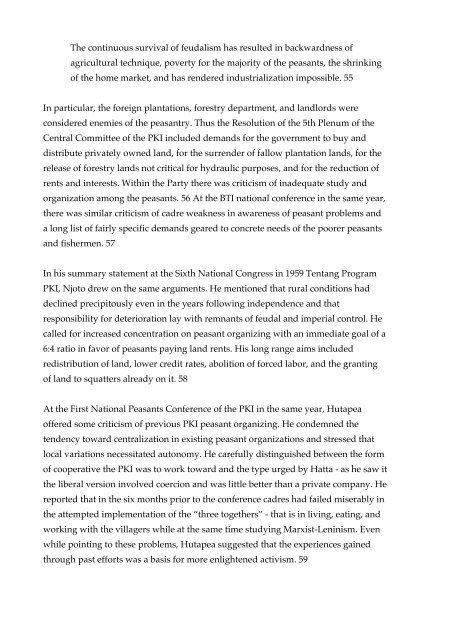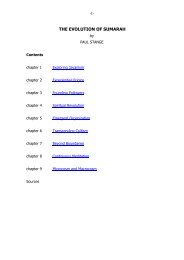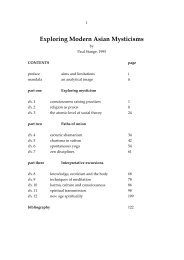Javanese Mystical and Marxist Dialectics - Paul Stange
Javanese Mystical and Marxist Dialectics - Paul Stange
Javanese Mystical and Marxist Dialectics - Paul Stange
You also want an ePaper? Increase the reach of your titles
YUMPU automatically turns print PDFs into web optimized ePapers that Google loves.
The continuous survival of feudalism has resulted in backwardness ofagricultural technique, poverty for the majority of the peasants, the shrinkingof the home market, <strong>and</strong> has rendered industrialization impossible. 55In particular, the foreign plantations, forestry department, <strong>and</strong> l<strong>and</strong>lords wereconsidered enemies of the peasantry. Thus the Resolution of the 5th Plenum of theCentral Committee of the PKI included dem<strong>and</strong>s for the government to buy <strong>and</strong>distribute privately owned l<strong>and</strong>, for the surrender of fallow plantation l<strong>and</strong>s, for therelease of forestry l<strong>and</strong>s not critical for hydraulic purposes, <strong>and</strong> for the reduction ofrents <strong>and</strong> interests. Within the Party there was criticism of inadequate study <strong>and</strong>organization among the peasants. 56 At the BTI national conference in the same year,there was similar criticism of cadre weakness in awareness of peasant problems <strong>and</strong>a long list of fairly specific dem<strong>and</strong>s geared to concrete needs of the poorer peasants<strong>and</strong> fishermen. 57In his summary statement at the Sixth National Congress in 1959 Tentang ProgramPKI, Njoto drew on the same arguments. He mentioned that rural conditions haddeclined precipitously even in the years following independence <strong>and</strong> thatresponsibility for deterioration lay with remnants of feudal <strong>and</strong> imperial control. Hecalled for increased concentration on peasant organizing with an immediate goal of a6:4 ratio in favor of peasants paying l<strong>and</strong> rents. His long range aims includedredistribution of l<strong>and</strong>, lower credit rates, abolition of forced labor, <strong>and</strong> the grantingof l<strong>and</strong> to squatters already on it. 58At the First National Peasants Conference of the PKI in the same year, Hutapeaoffered some criticism of previous PKI peasant organizing. He condemned thetendency toward centralization in existing peasant organizations <strong>and</strong> stressed thatlocal variations necessitated autonomy. He carefully distinguished between the formof cooperative the PKI was to work toward <strong>and</strong> the type urged by Hatta - as he saw itthe liberal version involved coercion <strong>and</strong> was little better than a private company. Hereported that in the six months prior to the conference cadres had failed miserably inthe attempted implementation of the “three togethers” - that is in living, eating, <strong>and</strong>working with the villagers while at the same time studying <strong>Marxist</strong>-Leninism. Evenwhile pointing to these problems, Hutapea suggested that the experiences gainedthrough past efforts was a basis for more enlightened activism. 59




